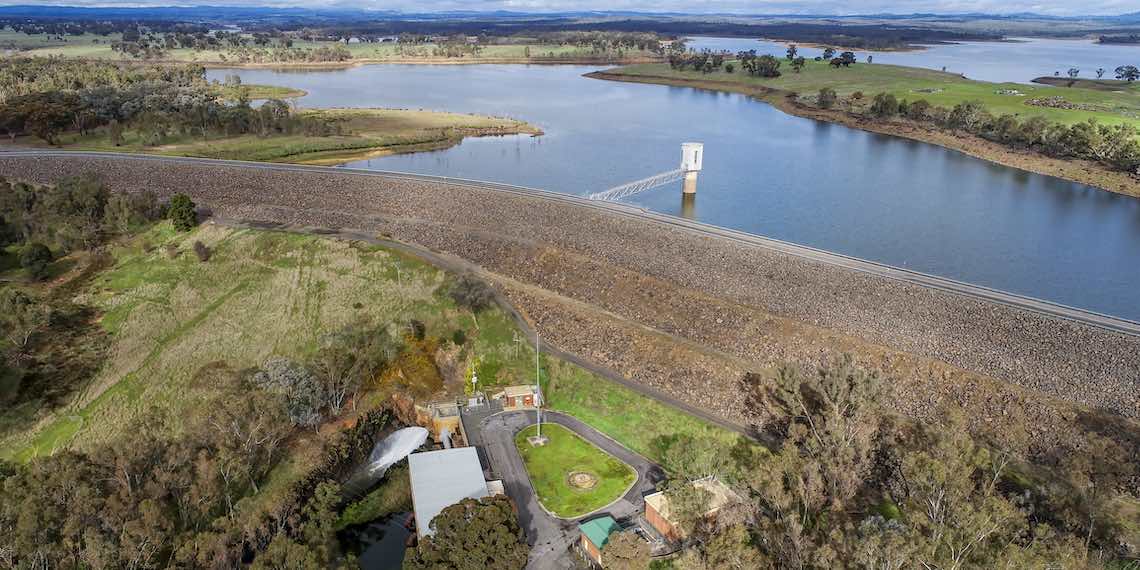Community engagement leads pricing submission for Victorian utility

In the next five years, Coliban Water is facing a near-tripling of capital investment compared to the past five years, with key pressures to overcome including ageing assets, population growth and climate change.
The utility is currently preparing its 2023-2028 Pricing Submission, detailing proposed levels of investment, service and pricing for the coming years, and has undergone an extensive community engagement program to inform the direction of the plan.
Given the extent of the investment needed to overcome challenges to water service provision — a whopping $430 million over five years — Coliban Water Managing Director Damian Wells said it was crucial for the utility to take a different approach to developing its next pricing submission.
“Our region has been growing steadily over previous decades, but the COVID-19 migration has seemingly accelerated that growth. A lot of people are moving out of Melbourne, and many of them are relocating to regional Victoria,” he said
“We're certainly at the very pointy end of the consequences of climate change. Our region is experiencing climate change in a very demonstrable way — there's been a 53% reduction in inflows to our Upper Coliban water storages over the past 25 years.
“We often hear about other regions in Australia experiencing 20% or 30% reductions in inflows, but a 53% reduction cannot be ignored.”
Wells said the issue of ageing assets was expressed very publicly for Coliban Water in the failure of its Kyneton Water Reclamation Plant in 2019 just before he started as Managing Director, which resulted in damage to the environment and damage to reputation, and much more investment is needed.
“Since then, we’ve signed up to a whole new policy to govern our approach to the environment and sustainability, which was driven by our board and staff. We've invested nearly $20 million in upgrades in the past two years to get that asset back on track,” he said.
“We've got some other ageing assets that will soon be at their limits in terms of EPA license compliance. We need to invest in assets and some of them are big, including the Bendigo Water Reclamation Plant. Some projects will take many years to deliver.
“Coliban Water has achieved financial stability in the past decade by deferring as much capital expenditure as possible. But we now have to pivot towards a significant period of investment.”
New plan, new process
Wells said Coliban Water will have more than $700 million of debt by the time it has finished the implementation of its 2023-2028 Pricing Submission program, and that taking on that extra level of debt required an intergenerational equity consideration for its customers.
“We engaged with our board very early on to where it was acknowledged that our approach to developing our next pricing submission needed to be different,” he said.
“We knew it needed to involve a much deeper and broader engagement because we need to front up to these big challenges of climate change, population growth and ageing assets, and we need to do it with our customers at the centre.
“We recommended to the board that we adopt a deliberative panel approach, which is effectively an engagement approach that is independently facilitated at arms-length to ensure its impartiality.”
Coliban Water engaged independent engagement consultants MosaicLab, who facilitated five days of work with a community panel derived from the utility’s customer database, ensuring all parts of the region and customer demographics were represented.
“We started with about 40 members for the deliberative panel and we posed a question: how do we be fair to customers today while preparing for the future? This question very purposefully brings in the question of intergenerational equity,” Wells said.
“The initial part of the program focused on education for panel members, so that they understood the challenges that we face. Across a couple of days, they were able to request expert speakers, too. They requested speakers from the CSIRO on climate science, and speakers from government, and other agencies, as well.
“Following this, the community panel started working up recommendations as to what they thought we needed to do over the next five years, which took into account how we would respond to ageing assets, population growth, and climate change.”
Community minded
Wells said the community panel produced some invaluable insight into how the community would like to see Coliban Water facilitate its capital investments, and why.
“Our community acknowledged that we needed to invest more, and that we needed to take on more debt to fund investment,” he said.
“As people benefit over the life of that asset, they contribute to paying for that asset. Instead of trying to recover all of the investment from customers now, we intend to borrow, invest, and then recover those costs over the life of the asset.
“But, as they learned more, the community panel also realised there was no choice other than to also recommend a modest increase to customer bills. The panel understood that the investment needed to be big, but they also wanted to make sure we didn’t leave anyone behind.
“They want us to support the whole community. So they recommended we double the funding of our hardships program to $570,000, which is used to support customers who are experiencing vulnerability or financial hardship.”
Wells said another request from the community was that Coliban Water does its very best to reduce or remove price shock.
“While nobody likes a price rise, our customers express a preference for slow and incremental price increases, they understand that is necessary. But they don’t want us hitting them with price spikes,” he said.
“And we know that the longer we wait to make these investment decisions, the more likely we are to expose our customers to a future price shock as well as service failures. Taking action now is wise in the customer's interests.”
Working together
While Coliban Water certainly has a lot of work ahead, Wells said taking the time to deepen and broaden its approach to customer engagement is well worth it, as it ensures the community understands and supports the plans being implemented for their most essential needs.
“We really need to make sure the community understands the work that we do and the work that we need to do, because a lot of what we do is invisible. As long as people can turn on the tap and flush the toilet, we're not really top of mind,” he said.
“But the onus is on us to explain ourselves. If we are going to ask customers to pay a little bit more for these essential services, we need to ensure everyone understands why.
“What we've found is that when reasonable people are given good information, they make great decisions. It's really about trusting the community to make judgments about their future.
“And that's what they've done in this process. It's about ensuring we're supporting the community to understand, and to buy into, their water services.”
Aside from helping Coliban Water draft a pricing submission that is equitable and effective, Wells said the process of engaging with the community has given him confidence that the plans being implemented in the next five years will be successful.
“We’ve just closed our broader public consultation period, but we've had 455 individual surveys completed online and we've also hosted a number of pop-ups across the 49 towns that we serve. We went out into our communities and stood on the streets of many of our towns to have a yarn with people,” he said.
“I was blown away with the results. From the surveys, 86% of respondents said they believe we've got the balance right in terms of the cost of our services and the level of our planned investments.
“We’re seeing huge support from the community. No one likes a price rise, but they can see that there's a compelling case for what we’re proposing. It’s been an incredible process. And, with the community's support, we can meet all of our challenges.”

